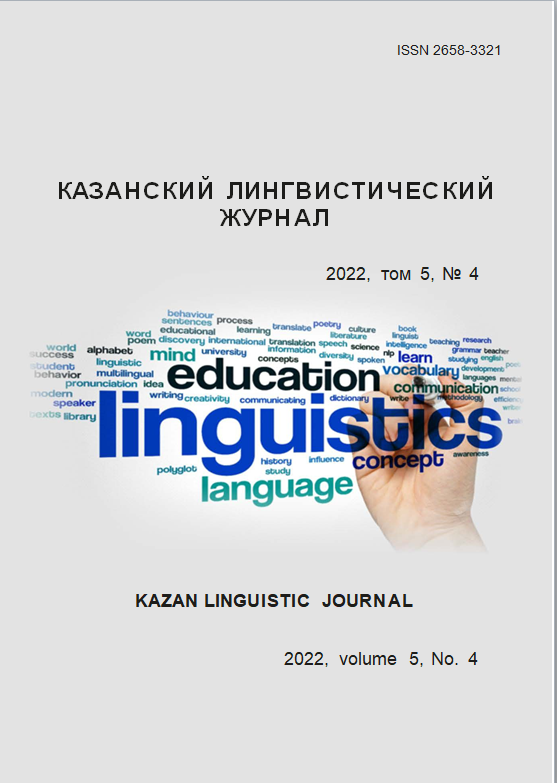Methodological Experiment as a Tool Development of Linguocultural Competence of Foreign Students
https://doi.org/10.26907/2658-3321.2022.5.4.437-450
Keywords:
Russian as a foreign language, linguocultural competence, culturally significant informationAbstract
The article is devoted to the topical issue of conducting an experiment to assess the effectiveness of teaching the Russian language to foreign students. The goal is to describe the technology of conducting a methodological experiment on the example of the process of developing the linguocultural competence of foreign undergraduates. The objectives of the study are to demonstrate the procedure of a methodical experiment, to test it in a study group, and to interpret the results obtained. The criteria for experimental activity are described, the stages of conducting a methodical experiment and their functions in the learning process are characterized.
The author's definition of «linguocultural competence» concept is given, its components (cognitive and activity) are presented, the content of each of them is described in detail.
As an example, a phased development of a methodological experiment is presented, the purpose of which was to create and test a set of exercises and tasks aimed at developing and improving the linguocultural competence of foreign undergraduates. The stable units containing culturally significant information served as linguistic material. The paper presents the specification of the control and measuring materials complex for the input and final verification of the level of knowledge and skills of undergraduates, examples of test tasks are given. The content of the training stage of the experiment is described, examples of instructions for tasks that were used in the classroom and independent work of students are demonstrated. At the end of the experimental work, results were summarized and conclusions were formulated. The conditions conducive to the effective implementation of experimental work are noted, barriers are identified that impede the successful development by foreigners of a foreign cultural space, fixed in linguistic signs.
References
References
The New Philosophical Encyclopedia: V 4 tt. / Editorial Board: V.S. Stepin, A.A. Gusejnov, G.Yu. Semigin, A.P. Ogurcov i dr. T. IV. M.: Mysl'; 2010. (In Russ.)
Modern dictionary of foreign words / Lead Ed. L.N. Komarova. M.: Rus. yaz.; 1992. (In Russ.)
Krysin L.P. Educational dictionary of foreign words. M.: Eksmo; 2009. (In Russ.)
Kodzhaspirova G.M, Kodzhaspirov A.Yu. Pedagogical Dictionary. M.: Akademiya; 2001. (In Russ.)
5. Lexical minimum in Russian as a foreign language. The second certification level. General proficiency / edited by N.P. Andryushina. SPb.: Zlatoust; 2015. (In Russ.)
5. Lexical minimum in Russian as a foreign language. The second certification level. General proficiency / edited by N.P. Andryushina. SPb.: Zlatoust; 2019. (In Russ.)






